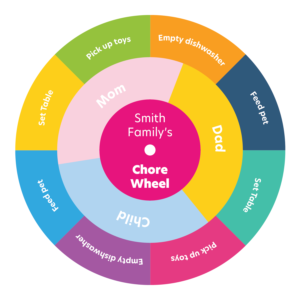Chores can play an essential role in helping your child develop lifelong skills. Here’s a list of chores for kids of all ages!
There’s a lot to be gained from learning to help with chores at a young age. Studies show that chores are a key indicator of which children will develop into independent adults and that children who participate in household chores learn life skills that help them develop into confident and capable adults.
Among many other skills, chores teach self-reliance, problem-solving, critical thinking, and teamwork. Chores help to develop a child’s work ethic, time management skills, and can help strengthen the family bond. When your children see you participating in chores, they feel as if they are equal and contributing to the success of the household. Additionally, it’s valuable to see your children as competent and capable individuals by providing them with the opportunity to showcase their ability to complete more complex tasks. You might even be surprised what they are capable of!
International best-selling author and parenting expert Elizabeth Pantley suggests introducing the “when/then” technique. She describes this strategy as, “‘When your homework is done, then you can play outside.’ Or ‘When your pajamas are on and teeth brushed, then we will read a book.’ What makes this idea work is that it’s a simple reminder and adds something to look forward to afterward.” Elizabeth explains that when you involve your children in the process and have them pick a few chores they enjoy, they might become more willing to participate.
Here are a few important rules to remember when introducing chores to your children:
- Show, don’t tell! Remember, they are learning new skills. Be patient. First, show them step by step, then have them help you before they try it themselves.
- Don’t focus on perfection! No one is perfect. If you intervene or criticize, you may discourage your children from wanting to help and defeat the whole purpose.
- Be consistent! Whether you keep a schedule or create a chore wheel, be consistent with how you distribute the household chores. This also means being consistent with follow-through. If your children aren’t expected to follow through, they’ll start to expect you to finish their chores for them.
- Give lots of praise! Who isn’t more motivated when they know they’re doing a good job? According to WebMD, “Get that praise going right away! Don’t wait until the chore is done. Praise and encourage the child while the chore is in progress.” In other words, show your child lots of support and encouragement in order to help motivate them to complete the task in front of them.
To help get you started, we’ve created a list of age-appropriate chores for children ages 2 through 12 and beyond.
Chores for Kids Ages 2 – 3
Have your toddler complete easy one- or two-step tasks such as…
- Cleaning up their toys
- Putting away their dirty clothes
- Straightening up the blankets on their bed
- Wiping up spills
- Helping to make snacks
- Dusting easy to reach spaces
- Feeding the family pet
Chores for Kids Ages 3 – 5
Teach your preschooler how to be more independent by…
- Emptying the garbage bins
- Making their bed
- Collecting the mail or newspaper
- Clearing the table after meals
- Filling their cereal bowl
- Putting away the utensils from the dishwasher
- Sweeping up crumbs
- Laying out their outfit for the day
Chores for Kids Ages 5 – 7
Have your young children complete simple tasks such as…
- Keeping their bedroom tidy
- Sweeping or vacuuming
- Setting and clearing the table before and after meals
- Sorting the laundry
- Helping pack lunches
Chores for Kids Ages 7 – 9
Give your school-age kids more responsibility by…
- Loading the dishwasher
- Helping to make dinner
- Making their own snacks
- Putting away their laundry
- Making simple breakfasts
- Completing more complex pet care (ie. walk the dog, help clean the fish tank)
Chores for Kids Ages 9 – 12+
Teach your pre-teens time management skills by…
- Unloading the dishwasher
- Washing dishes
- Doing the laundry
- Changing their bedsheets
- Cleaning the bathroom
- Cleaning windows and mirrors
- Washing the car
- Mowing the lawn
- Cleaning the kitchen
- Cooking simple meals, under supervision
- Caring for younger siblings (practice with an adult present first)
Make Chores Fun With a Chore Wheel
Here’s a fun and easy way to make chores exciting and involve the whole family!

Materials:
- Construction paper
- Scissors
- Marker
- Split pin
Instructions:
- First, start by having an adult cut two circles out of construction paper, one larger than the other.
- Help your child write each family member’s name on the smaller circle and a different chore in each section of the larger circle. Feel free to use some of our suggestions above or brainstorm your own!
- Connect the two circles by using a split pin in the centre.
- Have your child spin the chore wheel to decide which chore to tackle first. Take turns spinning the chore wheel or create one for each member of the family with chores tailored to each family member’s age.







